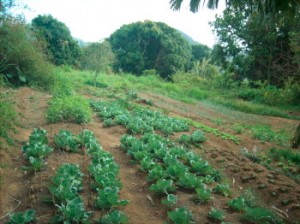 Although a key protagonist in global warming and erratic weather patterns, as both a contributor to greenhouse gases and a major victim of their effects, agriculture has been largely neglected in previous climate change talks. But there are signs that this attitude may be shifting. Many countries have included agriculture in their Intended Nationally Determined Contributions (INDC).
Although a key protagonist in global warming and erratic weather patterns, as both a contributor to greenhouse gases and a major victim of their effects, agriculture has been largely neglected in previous climate change talks. But there are signs that this attitude may be shifting. Many countries have included agriculture in their Intended Nationally Determined Contributions (INDC).
These are climate pledges made by countries ahead of the UN Conferences of the Parties (COP21) negotiations currently underway in Paris, and which are expected to help shape any new climate agreement that the conference might produce.
Friday’s session – Scaling up innovative approaches to climate-smart agriculture in Africa – highlights proven solutions based on climate-smart agriculture, that can be integrated into INDC implementation. The event, jointly organised by the Technical Centre for Agricultural and Rural Cooperation (CTA) and the CGIAR Research Program on Climate Change, Agriculture and Food Security (CCAFS), showcases practical and sustainable technologies for small-scale farmers in combating the effects of shifting weather patterns, as well as tools, policies and finance mechanisms that can help to foster this approach.
“Smallholder farmers in developing countries are likely to be among the people hardest hit by climate change because of agriculture’s dependence on the weather and the low level of resilience of farming to climate variability and change,” said CTA Director Michael Hailu. “The good news is that innovative approaches are being developed to meet this challenge. One of these approaches – climate-smart agriculture – aims to increase farm productivity and incomes in a sustainable manner, enable farmers to adapt and build resilience to climate change and (where possible) reduce greenhouse gas emissions.”
Climate-smart agriculture (CSA) includes practices and technologies that increase productivity in a sustainable manner, support farmers’ adaptation to climate change and reduce levels of greenhouse gases. Examples of CSA practices that are already producing concrete impacts include agroforestry, conservation agriculture, drought tolerant crops, low-cost livestock feeds to preserve degraded rangelands and innovative insurance schemes to protect farmers against losses.
Among specific solutions presented at today’s event are a scheme to help four million farmers obtain seasonal weather forecasts in Senegal, index-based livestock insurance as a tool against drought loss in Kenya and using ICTs as a solution to improve farmers’ resilience to climate change in East Africa. The session will explore what agricultural options can be scaled to meet the targets in INDCs, which partnerships models are effective for climate-smart solutions and key challenges and knowledge gaps of going to scale.
The number of smallholder farmers is growing fast, from roughly 550 million farms today to an expected 750 million by 2030. Climate change puts great pressure on smallholder agriculture to rapidly evolve. “We need to see farmers adopting climate-resilient technologies on a large scale, and make the most of social and economic innovations,” said Bruce Campbell, who leads the CGIAR Research Program on Climate Change, Agriculture and Food Security (CCAFS). “There are many successful innovations that we can learn from and replicate, such as mobile technologies and services that rapidly disseminate climate information directly to farmers.”
Support will be crucial if farmers are to have a real chance of using climate-smart agriculture to offset the challenges they face. Reliable information will be critical in helping them to identify proven solutions, and cooperation among institutions will be key to developing and disseminating best practices and promoting conducive policies for climate-smart agriculture. Although many innovative climate-smart agriculture practices already exist, they remain largely unknown beyond the immediate area where they are being practised. As a result, there is an urgent need to spread information about their potential and scale proven practices up and out to other small-scale farmers who could benefit from them.

This press release is a perfectly crafted piece of propaganda. Science has being hijacked by politicians directed by hidden hands creating and funding all these so called deceptive organizations to foster their agenda, CGIAR Research Program on Climate Change, Agriculture and Food Security (CCAFS). Acceptance of authority is the very denial of truth. “In questions of science, the authority of a thousand is not worth the humble reasoning of a single individual.” quote by Galileo.
watch cowspiracy:
https://www.youtube.com/watch?v=5druuucDrTI
EDUCATE YOURSELVES
What a scam.